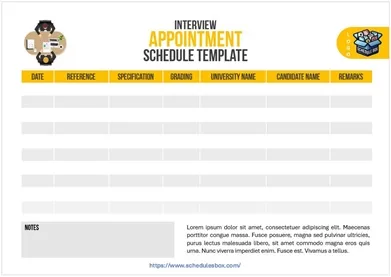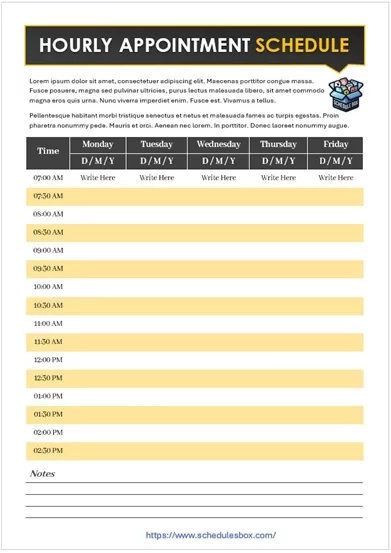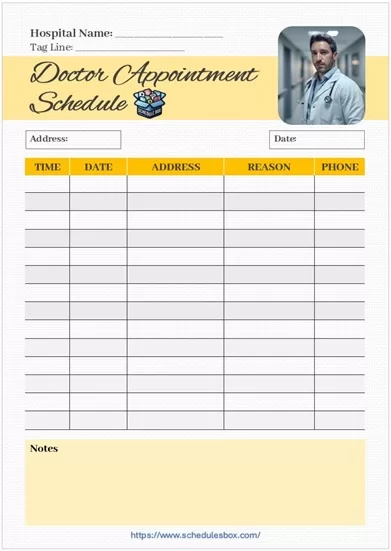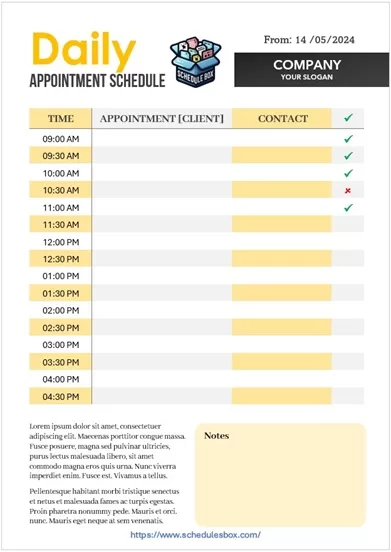Managing schedules efficiently is now more important than ever in this fast-paced world we are living in. It becomes key as far as your streamlined scheduling process that is used for either running small businesses, managing teams, or organizing personal lives is concerned. However, sometimes it’s more of a pain to use manual scheduling tools rather than being helpful while doing other things that are equally important like attending meetings among others. High chances such as double booking or forgetting an appointment can happen due to human errors.
These Appointment Schedule Templates come in as a game-changer. They save time by helping in planning and managing various activities that happen within the organization; as one example, this includes helping to reduce errors and enhance productivity. Let’s get started with where this organization is at by understanding the specifics of how these can change your scheduling processes.
What Are Appointment Schedules?
Appointments are pre-arranged plans that specify the exact timings for meetings or events. They are used as systematic templates to oversee time properly to avail commitments without contradiction or misunderstanding. To support individuals and groups in reserving time for various tasks during an organized day, appointment schedules are divided into distinct slots. They may be made either manually on paper or electronically by using calendars or scheduling software which provides adaptable options for customization depending on user requirements.
Appointment schedules are likened to a mere timetable for the day but in essence, they guide all activities. They provide direction on what must be accomplished at what time. This helps streamline work processes and consequently increases efficiency. They are therefore very essential to organizations as they ensure that customers or workmates are not kept waiting unnecessarily but are attended to as expected. This will help you avoid being overwhelmed by other things since you can easily track your commitments. To this end they help business people to maintain their professional image as well as making sure that they serve their customers promptly without delays. Moreover when used in personal life it makes it easier for one to strike balance between different activities hence avoiding such issues as over-commitment. Appointment schedules help people to use their time wisely by planning how they spend every hour of their day in an orderly manner as they go through tight schedules each day.
Key Features of Effective Appointment Schedules
It is critical to have a good time management method that includes effective appointment schedules, for this allows smooth coordination between people. This is done through having clearly defined time slots which help avoid conflicts as well as any form of ambiguity which may lead to disorganization. For any well-organized program, simplicity and interpretability are essential factors when using a schedule since everyone involved in making appointments must comprehend them fast without missing out important things or being late in any way. Such schedules should also accommodate different users by being easy to use and intuitive, hence serving various individuals regardless of their knowledge of booking software.
Effective appointment schedules embody flexibility as a cardinal principle. This is particularly important in high-speed environments where unpredictability may prompt changes without causing too much commotion. In contemporary times, these schedules usually have links with digital tools like online calendars or scheduling apps that aid in real-time updating. Apart from enhancing flexibility, such integrations provide better access enabling participants to make shifts, confirm or edit their meeting time from almost everywhere. Moreover, through email alerts and messages on mobile phones; people get notified about upcoming events in order not to be taken by surprise at the 11th hour by cancellations due to unclear reasons.
I mean calendars that work go further than just seeing a bunch of times for meetings—they give context including reasons for meeting, people attending the meeting venue or address, and materials needed if any. This information will also allow attendees plan ahead of time in order to have more meaningful and efficient talks which are productive. In addition they serve as a tracking tool where commitments can be made and held accountable so that people do not forget after they leave the meeting room. An appointment schedule is more than managing time; it is also about launching points for working together through communication.
Free Appointment Schedule Templates
Here are previews and download links for these Free Appointment Schedule Templates created by our staff using MS Word to assist you.
Types of Appointment Schedule Templates
In order to manage tight deadlines, maximize productivity and avoid overlaps or delays, a preference for daily appointment schedules could be fulfilling for an individual or organization that requires breaking down tasks and commitments for one day into finer bits. Such schedules are typical among professionals handling numerous brief-term engagements, for instance, doctors, consultants, customer service representatives, and so on and so forth. They are generally broken down into hourly brackets or even minutes thereby making it possible to know what should be done each time something is meant to take place in between these hours.
Weekly schedules give a wider view where users can strategize on them for one week. This type of timetable is good when there are lots of regular events to balance like team meetings, project time frames, or personal appointments. It allows you to manage more effectively by apportioning time among various days and prioritizing your workload. These are most common among learners, administrators and other families who have tight schedules but still want to do what matters most with some element of freedom left.
Monthly appointment schedules focus on long-term plans, marking important dates and events in a given month. They are used to keep track of significant events in one’s life such as golden and silver wedding anniversaries or project completions as well as recurring tasks like accounts payment or housekeeping schedules in general. Such schedules are especially useful for cyclical industries like marketing where campaigns and promotions have to be done earlier on. They help individuals know what to expect in a month thus preparing adequately.
Industry-specific appointment schedules are created with specific professions or sectors in mind. For example, a medical practitioner might use schedules that take into account patient records and treatment processes while a hair salon may have stylist scheduling based on availability and service duration. In a similar vein, the business world could make use of schedules that coordinate with project management software applications or customer databases. It is through these personalized schedules that time management is tailored to the industry’s unique needs thereby boosting productivity on the part of professionals who use them.














